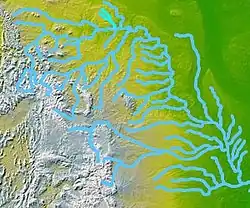| Poplar River | |
|---|---|
 | |
 Poplar River shown highlighted | |
| Location | |
| Countries |
|
| Province | Saskatchewan |
| State | Montana |
| Counties | |
| Physical characteristics | |
| Source | |
| • location | Wood Mountain Hills |
| • coordinates | 49°15′13″N 106°23′32″W / 49.25361°N 106.39222°W[1] |
| Mouth | |
• coordinates | 48°05′03″N 105°11′08″W / 48.08417°N 105.18556°W[1] |
• elevation | 1,942 ft (592 m)[1] |
| Length | 167 mi (269 km) |
| Discharge | |
| • location | Near Poplar, MT |
| • average | 122 cu ft/s (3.5 m3/s)[2] |
| Basin features | |
| River system | Missouri River |
| Tributaries | |
| • left | East Poplar River |
| • right | West Poplar River |
Poplar River[3] is a tributary of the Missouri River, approximately 167 miles (269 km) long in Saskatchewan in Canada and Montana in the United States. The river is composed of three main forks – West, Middle, and East Polar Rivers – that have their source in the Wood Mountain Hills of the Missouri Coteau.[4]
Along with the Milk River and Big Muddy Creek, it is one of three waterways in Canada that drain into the Gulf of Mexico.
Description
Poplar River and its main forks of West, Middle, and East Poplar Rivers begin in the Wood Mountain Hills[5] in Saskatchewan. West Poplar River rises near Killdeer, Saskatchewan and flows south-east, into north-eastern Montana, past Richland and across Daniels County.[6] Poplar River (Middle fork) rises north-west of Rockglen, Saskatchewan and flows south-east, into north-eastern Montana, and passes west of Scobey. The two forks unite in the northern part of Fort Peck Indian Reservation. The combined river flows south-east, then south-southwest, and joins the Missouri River near Poplar.
The East Poplar River begins south of Willow Bunch, Saskatchewan and flows south out of the hills and meets the Poplar River in Montana upstream from where the West Poplar River meets it.[7] Along the course of the East Poplar River, on the Canadian side of the border, is Poplar River Power Station, which is a coal fired station owned by SaskPower. Morrison Dam was built along the river in 1977 to provide cooling water for the station.[8] Girard Creek, which originates at Fife Lake, and East Poplar River are the primary inflows for the Morrison Dam Reservoir.
Variant names
The Poplar River has also been known as: Lost Child Creek and Middle Fork Poplar River.[1]
See also
References
- 1 2 3 4 "Poplar River". Geographic Names Information System. United States Geological Survey, United States Department of the Interior.
- ↑ "USGS Surface Water data for Montana: USGS Surface-Water Annual Statistics".
- ↑ "Poplar River". Canadian Geographical Names Database. Government of Canada. Retrieved 9 February 2023.
- ↑ Penner, Lynden. "Missouri Coteau". The Encyclopedia of Saskatchewan. University of Regina. Retrieved 13 February 2023.
- ↑ "Wood Mountain Plateau". The Encyclopedia of Saskatchewan. University of Regina. Retrieved 13 February 2023.
- ↑ "West Poplar River". Geoview. Geoview. Retrieved 13 February 2023.
- ↑ "Poplar River". International Joint Commission. International Joint Commission. Retrieved 14 February 2023.
- ↑ "Poplar River Power Station". SaskPower. SaskPower. Retrieved 14 February 2023.
External links
 Media related to Poplar River (Montana–Saskatchewan) at Wikimedia Commons
Media related to Poplar River (Montana–Saskatchewan) at Wikimedia Commons